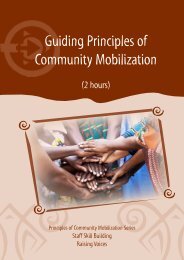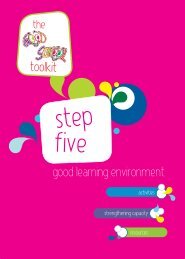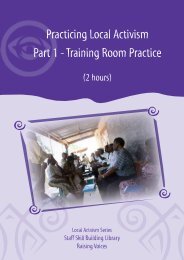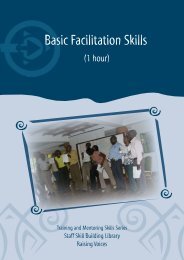CA C 1 - Raising Voices
CA C 1 - Raising Voices
CA C 1 - Raising Voices
Create successful ePaper yourself
Turn your PDF publications into a flip-book with our unique Google optimized e-Paper software.
<strong>CA</strong>C 2<br />
■ assuming things about the speaker.<br />
■ responding with your own feelings instead of focussing on what the speaker is saying.<br />
Activity 2.18 Listening Effectively (2 hours)<br />
Objective<br />
■ Identify and practice use of listening skills.<br />
Steps<br />
Part A – Identifying and Practicing Effective Listening Skills (1 hour)<br />
1. Explain to the participants the following:<br />
■ Effective listening is a skill that can be learned and improved.<br />
■ Effective listeners make a commitment to give their time and energy to the person who has come<br />
to<br />
them for help.<br />
■ Effective listeners begin with a clear understanding that to help the speaker, the listener needs to<br />
adopt a supportive and a deliberate attitude; this requires compassion and skills.<br />
■ In this activity, participants will begin by identifying and practicing some of those skills.<br />
2. In the main group, brainstorm skills of an effective listener. Responses may include:<br />
■ Ask open-ended questions.<br />
■ Do not interrupt the speaker.<br />
■ Make eye contact (if appropriate).<br />
■ Project reassuring body language.<br />
■ Ask clarifying questions instead of jumping to conclusions.<br />
■ Reflect back to the speaker what is being understood.<br />
■ Help the speaker make connections in what they have said.<br />
■ Establish a clear goal for what the speaker wants from the listener.<br />
■ Build trust by protecting confidentiality.<br />
■ Concentrate on what is being communicated instead of pretending to listen.<br />
3. Ask the participants to get into the same pairs that they were in the previous activity (Activity 2.17),<br />
and this time ask the listeners to use effective listening skills. After ten minutes, ask the listener and<br />
the speaker to change roles so that all participants have an opportunity to be heard and to practice<br />
listening skills.<br />
4. When both participants have had an opportunity to practice their listening skills, ask them to give<br />
each other specific feedback on what they liked and what skills they could improve. Remind them<br />
that no one is a perfect listener, so they have to give their feedback with a view to being helpful.<br />
5. Discuss as a group what it felt like to be heard.<br />
Part B – Exploring Emotions and Listening (1 hour)<br />
1. Explain that to be an effective listener you also need to be able to imagine what the speaker is<br />
feeling and what personal meaning the speaker attaches to the story they are relating to you. You<br />
also have to be a skilled observer.<br />
Mobilising Communities to Prevent Domestic Violence<br />
<strong>CA</strong>C 2<br />
315

















